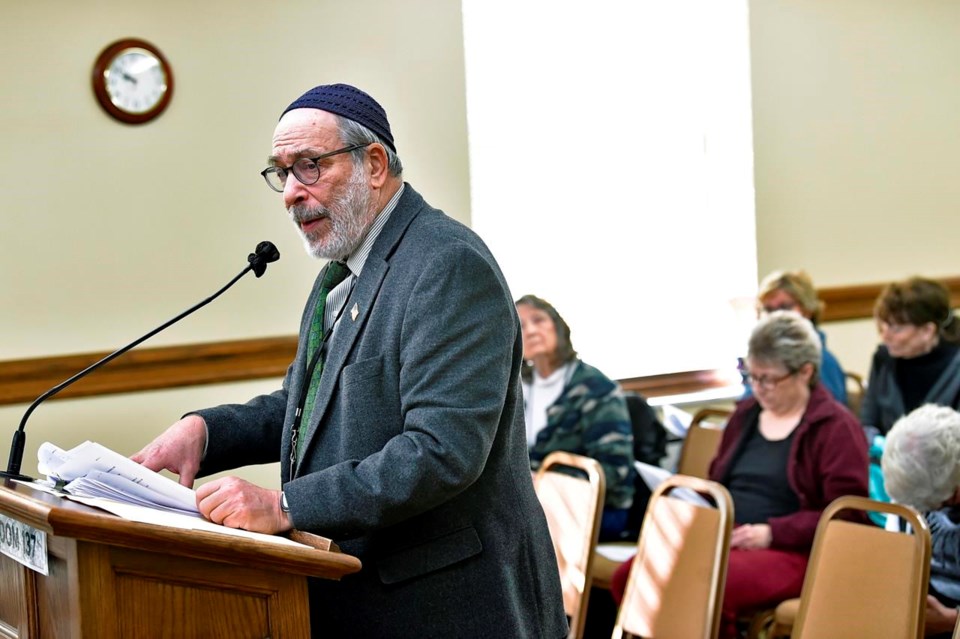HELENA, Mont. (AP) — Abortion rights groups are challenging abortion bans in some states by arguing the bans — supported by certain religious principles — violate the religious rights of people with different beliefs.
Conservative Christians for decades have argued that life begins at conception and abortion should be illegal and 47 states have laws that allow health care workers to opt out of providing abortions if that violates their religious beliefs or morals.
In Montana, a state lawmaker who is an ordained Jewish rabbi argues religious freedom laws that protect health care workers' religious beliefs should also protect abortion rights for those who belong to religions that support such rights.
“It seems that both sides should be permitted to have equal protections for their religious conscience,” said Rep. Ed Stafman, a Democrat.
States have been creating their own abortion laws after the U.S. Supreme Court overturned its landmark Roe v. Wade ruling last summer. Abortion laws in Florida, Indiana, Kentucky, Missouri, Utah and Wyoming have faced challenges on the basis of religious freedom, according to the Kaiser Family Foundation. None of those cases have been resolved.
The Montana bill faces uncertain prospects in the state's Republican-controlled legislature, but Stafman noted that several members of the House Judiciary Committee that heard testimony on the bill on Friday are members of the Montana Freedom Caucus, a group of conservative lawmakers whose key issues include religious freedom.
Montana's House Judiciary Committee, along with the House itself, have already passed a bill this session expanding the state law to allow health care workers to decline to participate in any medical procedures that violate their conscience or religious beliefs.
Stafman's bill does not say how the state would determine if religious protection should be granted, but health care facilities can ask for employees to submit in writing their religious or moral refusals to participate in abortions.
The Centers for Medicare and Medicaid form for those seeking an exemption from a required COVID-19 vaccine requires just a signature and no explanation. Under federal law, an individual can seek a religious exemption regardless of whether the religious beliefs, observances or practices are common or non-traditional and regardless of whether they are recognized by any organized religion.
Republicans on the committee questioned how far the proposed law could go in protecting actions claimed as religious beliefs, including whether it should protect infanticide or the killing of people who violate religious tenets.
“Do you admit then that a religious exemption for killing a child that has been born ... exists under your premise behind this bill?" Republican Rep. Lee Deming asked.
“No,” Stafman replied. “There's no religious exemption to kill a child that's been born under my bill."
There are limitations to religious protections, “when there is a very, very broad public consensus on morality like there is around polygamy and certainly around murder,” Stafman said.
“In this case, the case of abortion, there certainly is no consensus,” he said. Polls show society is divided, as are different religious communities, he said.
Some religious groups, including the Roman Catholic Church, Assemblies of God, Church of Jesus Christ of Latter Day Saints and the Southern Baptist Convention, oppose abortion rights, with few to no exceptions, according the Pew Research Center.
The Episcopal Church, the Evangelical Lutheran Church in America and the United Methodist Church support abortion rights, with some limits. Conservative and Reform Judaism, the Presbyterian Church, Unitarian Universalist and the United Church of Christ support abortion rights with few or no limits, Pew said.
Islam, Buddhism, the National Baptist Convention and Orthodox Judaism hold no clear position on the procedure.
Judaism has a tremendous respect for life, Stafman said, and it differentiates between a woman as a life and a fetus as a potential life.
Stafman said he respects the religious beliefs of those who came to testify against his bill, quoting the Bible and scripture.
“Those are sincere religious beliefs, but so are mine,” he said.
Amy Beth Hanson, The Associated Press



